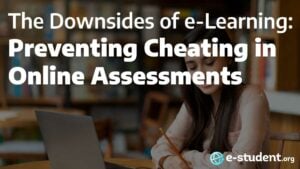Table of Contents
Online learning: does it even work? How can you be sure you’ll learn something? How do you know it’s not a waste of your time?
The short answer: Yes, E-learning does work.
In some cases, students can certainly have a negative experience with online learning. However, there’s ample evidence to suggest that e-Learning is effective. Sometimes, even more so than traditional education.
Noesgaard and Ørngreen analyzed a variety of studies in their paper The Effectiveness of e-Learning.
They found that only 10% of the participating studies listed E-learning as “not effective.” Yet, they noted that the effectiveness of E-learning depends on the specific learning outcomes you’re after.
Following are some of the benefits to be gained from E-learning:
- Continue learning from the comfort of your own home
- Further your schooling
- Open yourself up to more job opportunities
- Take advantage of innovative learning techniques and strategies
If classroom learning has always posed a challenge, online learning allows you to learn at a pace that works for you. You can go through the material as fast or as slow as you need — with the opportunity to get help when you need it.
Instead of lectures, pop quizzes, and lengthy examinations, E-learning provides greater interactivity and engagement. Educators and students can create virtual spaces to share their knowledge, provide feedback, and take ownership of their studies.
Classroom instruction, especially formal education, requires plenty of time to enact changes. On the other hand, online learning allows educators to quickly adapt to innovative learning strategies — and you reap the benefits of efficient learning.
If you’re looking to further your career by taking courses and earning more credentials, E-learning is a perfect solution. With flexible scheduling, real-life projects, and portfolio-building work — online learning provides a viable way to get ahead on your career path
Why self-paced learning is more effective than instructor-paced learning
Instructor-paced learning requires you to attend classes at a predetermined time and location. You sit through lectures and discussions, complete homework, and take exams — all on your instructor’s schedule. If you don’t understand something, you have to find time to catch up.
With E-learning, many programs and platforms offer self-paced learning. You can watch lectures when it fits your schedule. There are online forums to discuss the material, and you can reach out to instructors or tutors immediately if you need help.
Much continuing education and online programs are designed with working people in mind. If there are set deadlines, they provide ample time for people with full-time jobs, families, and other commitments.
It can be very empowering to bear that much ownership over your instruction. E-learning offers a way for you to push yourself ahead beyond the rigid structure of formal institutions. This increases the effectiveness of your online schooling.
Incentive and motivation are the student's responsbility
E-learning and self-paced learning are useful tools — but only for students who are motivated to learn.
While E-learning allows students to learn at their own pace, if you have trouble managing your time or motivating yourself, online learning might not be the best fit for you.
Online learning increases student engagement and interactivity
“Being lectured at” is one of the most popular forms of traditional instruction. It appears early in the classroom experience, all the way through higher education in bachelor’s and master’s degree programs.

Sitting in a classroom or lecture hall — trying to pay attention and collect the most relevant information; you hope you’ve gleaned the information you need – whether that means passing the test, getting the certificate, or understanding how to use what you’ve learned in the lab.
While this works for some people, E-learning is more effective here. Lectures and instructional videos are recorded, and you can access them as many times as you’d like.
Many online courses feature shorter videos and interactive quizzes, and games that allow you to assess your progress as you go. With online forums, students and instructors alike can gather virtually to share popular posts and discuss the most challenging or exciting topics.
Increasing e-learning effectiveness through retention rates
Studies show that students learn better when information is presented in an interactive, engaging format, especially compared to classical lecture models.
Did you know? E-Learning also employs data and learning analytics to increase learning objectives further.
Many e-Learning platforms are taking advantage of scientific research. They’re adding proven learning strategies to help students retain the most information, master what they’re learning, and make tangible progress in their courses.
The role of data and science in the effectiveness of e-learning
As e-Learning becomes more popular and programs enjoy greater access to student data, these courses become more productive and efficient for learners.
Making courses more effective is a cornerstone of many E-learning platforms.
Data is hard to collect in a classroom, and implementing new technology and strategies poses a real challenge. Educators work with lower funds, fewer teachers, and rigorous external expectations — such as standardized testing.
Because E-learning can change quickly, new strategies are implemented much faster. Programs for E-learning are developed with the latest, most efficient learning tools and techniques. These include:
- Creating social and community learning opportunities
- Adding gamification to instruction
- Providing personalized learning paths for each student
- Offering real-world projects and feedback as students change careers
Language instruction is an excellent illustration of E-learning’s improvement compared to traditional classroom learning. In a classroom, you attend lectures — as frequently as every day — learning how to conjugate verbs and memorize vocabulary.
With E-learning programs such as Duolingo or Rosetta Stone, you learn a language differently. They’ve incorporated various strategies to help you learn better and increase your ability to speak your chosen language.
These apps change what it looks like to learn a language using gamification, personalized pathways, and immediate feedback.
E-learning adds these elements into your learning experience for every subject and proves to be better than traditional learning models.
Using e-learning for career development
If you’re looking for a flexible, efficient, budget-friendly way to change your career, e-Learning is a great option and is indeed very effective. Even if you’re just looking to add a few credentials to your resume — online learning is a great tool to increase your opportunities.
Many people used to attend “night school” to learn new skills and earn degrees for career advancement. This requires you to take classes in a specific location and is structured like traditional education systems.
E-learning changes the format — allowing you to access courses from anywhere with an internet connection whenever is convenient for you.
One of the most popular e-Learning formats, the Massive Open Online Course (MOOC), offers certificate, credential, and degree programs.
These are flexible learning paths for people looking to learn anything — but are especially helpful if you’re looking for a platform that will help you change your career trajectory.
Judging the effectiveness of e-Learning for career advancement provides a tangible measure of success. You can see what percentage of learners start a new career after completion and how many receive a pay raise or promotion.
For example, Coursera’s Data Science Professional Certificate program boasts a 39% career change rate and a 20% rate of individuals receiving tangible benefits like a pay raise or promotion.
For a fraction of the cost of conventional college or university programs, you can apply your work ethic to e-Learning and open up job opportunities for yourself.
These programs are developed in cooperation with companies like IBM, Google, and Amazon, so you can be sure they’re providing real-world job training.
In conclusion: is e-learning really effective or not?
Are you looking to E-learning as a flexible learning path?
Or are you after a verified, effective learning opportunity to advance your career?
E-learning can be difficult to compare with traditional learning. There are certain aspects of in-person instruction that E-learning can’t replace, which are important for students’ learning outcomes. But E-learning benefits plenty of people and provides an effective educational platform.
“What if we are missing more e-Learning specific definitions that are independent of face-to-face teaching, such as democratization and scalability? And as a last mental exercise, what if we started evaluating face-to-face instructions on these objectives?” — Noesgaard and Ørngreen, The Effectiveness of E-Learning
E-learning is an efficient way to learn, brush up on the skills you need, or find an entirely new career path. Capitalize on learner data to increase student outcomes. With the flexibility inherent in the online platform, E-learning can be more effective than traditional classroom learning.
Check out our blog today to learn more about E-learning and how you can take your next educational steps.



